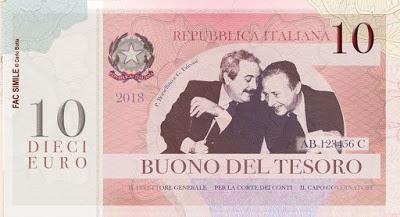The renunciation of one’s own sovereignty costs a lot. If a country decides to join the Eurozone, it must accept that it will not be able to devalue its currency in the event of an economic crisis. The Italian Lega is now trying to fulfil its election promises, even though the state coffers are empty. The solution? A parallel currency.
The idea is nothing new. What Claudio Borghi, the economic expert of the Lega Nord, came up with was tried out by Argentine society at the turn of the century: in 2001 the government in Buenos Aires launched “cuasimonedas” to plug its debt hole. Each province issued treasury bonds to meet payment obligations. The most popular became the Patacones of Buenos Aires province, which were given mainly to those employed in the state sector and social recipients, but with which one could pay everywhere.
The introduction of Argentina’s parallel currency initially led to chaos in the country: the rich transferred their dollars abroad (a total of more than 100 billion), the poor and the middle class had no choice and immediately spent the Patacones they received in fear of them becoming worthless overnight. However, this spurred consumption and helped the economy to get back on its feet. The good 2002 and 2003 harvests and the rising commodity prices on the world markets also helped to ease the financial situation of this eighth-largest country in the world. Argentina survived the crisis because it was able to devalue its money and because it has the most fertile soil in the world.
Italy, which is trapped in the euro zone, has less room for manoeuvre, which is why Borghi and Salvini want to introduce the so-called mini-bots (bot is the abbreviation of “buoni ordinari del Tesoro”). These would be mini notes for everyday use, with which the state could pay the companies for their services, but also citizens could pay their tax obligations. The weakness of the idea lies in the fact that nobody would be obliged to accept it, which could have similar consequences as in Argentina. However, since the new currency would have the free exchange rate to the euro, it could quickly be devalued. This would reduce labour costs in Italy and make Italian companies more competitive and, as a result, secure more tax revenue for the state.

The layouts of the Mini-Bots designed by the Italian graphic artist Carlo Botta. Source: carlomaxbotta.blogspot.com.
So Borghi’s idea is not stupid at all, even if it has disadvantages. Brussels is nevertheless allergic to it: it is indeed a creeping Italexit. Italians should nevertheless remain tough and devalue their currency so as not to repeat the mistake of the Greeks. Varoufakis also wanted to introduce a parallel currency, but obeyed the orders of the troika, and as a result Greece’s GDP fell by 23%. To be honest, Italian politicians have no choice: the country now has sovereign debt of 132 percent of GDP and a target negative balance of over 400 billion euros.




